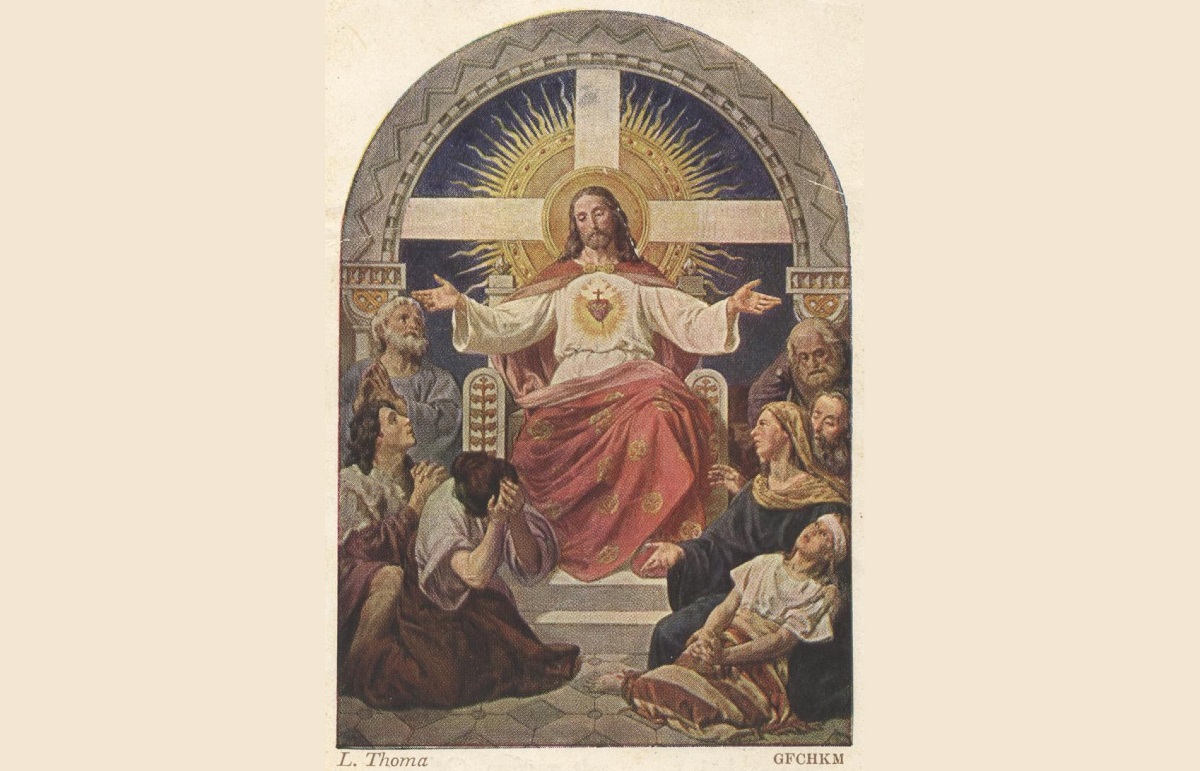By Vir Christi
On the morning of the third day, the heart which had stopped beating two days prior began to beat again, and has not ceased since. Whose heart is this? Why, the Sacred Heart of Jesus!
In the midst of all of the solemnities the Church celebrates around the month of June—Pentecost, Corpus Christi, the Nativity of St. John the Baptist, etc.—the Solemnity of the Sacred Heart gets overlooked. Why does the Church ascribe so much importance to an internal organ of Our Lord? Isn’t that kind of strange?
Why Celebrate the Sacred Heart?
The heart has always been associated in the human experience with love. When we’re describing extreme joy, we’ll talk about our hearts “singing.” When we’re evoking thoughts of extreme sadness as it pertains to love, we’ll use the phrase “heartbroken.” Because God seeks to relate to us so as to draw us deeper into Himself, He gives us visible signs to accomplish that drawing inward. The Sacred Heart of Jesus is an example of one of those visible signs.
Jesus literally died of a broken heart on the Cross, which was evidenced by the clear separation of the blood and water that flowed from His side when the soldier pierced Him. God loved the world so much that He came down and died on the Cross for us, an act of absolute humility for the sake of our salvation. But Jesus knew, even fixed to the Cross, that there would be souls who would reject Him despite knowing the message of salvation that He brought to the world. The imagery of the broken heart associated with the death of Jesus is appropriate; it reminds us not just of the official cause of death but also why Jesus allowed Himself to suffer that death in the first place. The burning Sacred Heart of Jesus is a perpetual reminder to us of how far God is willing to go for the sake of rescuing His children from sin and death.
At one point or another in our lives, we’ve all imagined what it would be like to have someone be in love with us. If we’re honest with ourselves, we’ve secretly wished to be crushed on or pined after in an authentic way; I mean the butterflies-in-the-stomach, tossing-and-turning and can’t-fall-asleep-at-night kind of way. Every human being desires to be loved. Spoiler: each of us is already guaranteed One in our lives who thinks of us that way! Take that love and multiply it beyond our understanding, and you begin to grasp at the truth of the Sacred Heart of Jesus. This is one of the keys to the mystery of the Christian faith. And it is something about which the world desperately needs to be reminded.
The World Needs It Now More Than Ever
When we look around at the world today, we see grief and misery. In countries like the United States, the average citizen is materially better off than the average person has ever been at any point in human history. And yet all across the board, it seems that people struggle more with grief and depression than in the past. How does this contradiction exist? It exists because rather than seeking the love of the Sacred Heart, which fills all things and satisfies all desires, human beings have desperately sought to fill up the emptiness in themselves with other things. Society demands that people exalt themselves, and has devised various mechanisms such as social media that make it far easier for people to do that than in the past. And yet for all of the proud boasting that people do, sadness and misery linger in so many places in society.
We think we understand what “love” is. Most of the time, though, what we’re defining as love is actually the fulfillment of a base desire. What Jesus promises through the Divine Mercy of the Sacred Heart runs so much deeper than that. It lays bare our imperfections and burns them away in the fire of his love. He sees us exactly for who we are, but He also knows who we can become. The enormity of that frightens people. We tend to fill up our hearts and attention with a lot of banal things, and call it “love.” We can’t comprehend what Jesus offers, and so we eagerly seize on these distractions. Everyone thinks they’ll find fulfillment pursuing their own idea of happiness. But is that really the case?
An interesting contradiction in the month of June, which the Church has dedicated to the Sacred Heart, is secular society’s focus on “gay pride” in this same month. To be clear, those struggling with homosexuality are our brothers and sisters in Christ, and they deserve our love and compassion. But the gay pride movement in the collective preaches that people should give in to their most selfish desires, and that everyone else around them must conform to their vision of the world. Nothing could be more diametrically opposed to this than the words spoken by Our Lord from the depths of His Sacred Heart when He said, “If any man would come after Me, let him deny himself, take up his cross, and follow Me” (Matthew 16:24). It is in self-denial and the willingness to make sacrifices that love is encountered, and from that encounter with love, true joy follows. Self-absorption leads only to loneliness and misery. The world has forgotten this fundamental truth.
We, as Catholics, can help remind them that only in charity and surrender of self to God is true happiness found. We can do this by living each day in the Sacred Heart, striving to be conformed to it as examples of God’s love and mercy.
How Do We Live in the Sacred Heart?
The Divine Mercy of Jesus is one of the greatest gifts to come from the Sacred Heart. For meditation on this we have the Chaplet of Divine Mercy. Make the recitation of the chaplet a regular part of your prayer life, and watch the graces flow! Another great prayer for meditation on the Sacred Heart is the Act of Reparation to the Sacred Heart, for all of the offenses committed against that very Heart in the world. And finally, one could use the Litany to the Sacred Heart. Prayers such as these help us to remember that Jesus desires to encase each one of us in the fire of divine love pouring forth from His Sacred Heart. They remind us to remain close to Him.
We have to be willing to strive to emulate all of the virtues—chastity, fortitude, prudence, justice, patience, etc.—in order to draw closer to the Sacred Heart. But as we seek to draw closer to Jesus by living in this way, we must beware of the trap of scrupulosity. We are all sinners, but we should not allow that to cloud our recognition of the fact that Jesus desires to be near each and every one of us in a unique way. If you were the only person in human history who ever committed a sin, from the dawn of time to the end of all things, Jesus would still have come and died for you anyway. Believe that. Don’t be afraid to love other people. Don’t be afraid to allow yourself to be loved by Jesus, either.
Heart of Jesus, salvation of those who trust in Thee, have mercy on us!

Vir Christi
Vir’s heart has been on fire for the Church from day one, and he dreams of the day when Constantinople will be a city again. He has a competitive drive satiated by sports and board games, but is also just as happy to sit down and read a good book for hours on end.






0 Comments